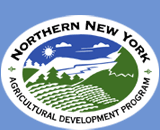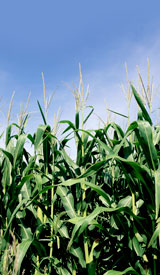July 2, 2010
Contacts: See list at end of release
Latest NNYADP Research Helps Reduce Dairy Cow Mastitis
The Northern New York Agricultural Development Program (NNYADP) has
posted the latest results of research evaluating ways to reduce
Klebsiella mastitis in dairy cows. “Klebsiella mastitis in Northern New
York: Cow adapted vs. environmental strains,” authored by Gary J.
Bennett, Ruth N. Zadoks and Ynte H. Schukken of Cornell University
Quality Milk Promotion Services is online at www.nnyagdev.org.
The Cornell researchers now suspect that many of the Klebsiella
infections originate in a cow’s dry (non-milking) period.
“The findings of our research with four Northern New York dairy herds
indicates particularly that the dry period may be a very important time
of first infection. Klebsiella bacteria may enter the mammary gland at
that time and grow there causing a persistent infection that later
appears as clinical mastitis after a cow enters the milk production
line,” says Dr. Gary J. Bennett, a veterinarian with Cornell University
Quality Milk Promotion Services, Canton, NY.
The NNYADP research project has visually and genetically identified
differences among Klebsiella bacteria found in cows with clinical
mastitis cases versus the dairy environment. Samples were collected at
four farms in the region.
“We observe many different strains of Klebsiella bacteria in a cow’s
environment, but only a relatively small number of strains cause
mastitis. The Klebsiella bacteria that cause clinical mastitis have
vastly different characteristics compared to bacteria cultured from the
farm environment. The bacteria that are ‘successful’ in causing
intramammary infections form a sub-population of all Klebsiella
bacteria,” says Dr. Ynte H. Schukken, a veterinarian, professor of herd
health, and director of Cornell’s Quality Milk Production Services.
The Cornell research team is currently trying to identify the genes
associated with infection susceptibility with an eye toward developing a
vaccine.
In earlier research funded by the farmer-driven Northern New York
Agricultural Development small grants program, Bennett, Zadoks and
Schukken analyzed milk, feed, water, manure and bedding samples from NNY
dairy herds to identify and type hundreds of strains of Klebsiella.
That research also showed that stand, alley and barn hygiene is critical
for controlling cow exposure to Klebsiella bacteria. Particular
attention must be given to alleyway hygiene, an important and often
overlooked component of Klebsiella mastitis control.
Dairyman Bernhard Gohlert of Hilltop Farms, Lowville, NY, says, “The
number of Klebsiella mastitis cases here dramatically dropped once we
applied the best practices suggested by the early research.”
Doug Shelmidine of Sheland Farms in Belleville, NY, says, “Klebsiella
has become an issue for more and more Northern New York dairy farms.
This regionally-based research has provided outcomes from several herds
so each dairy can weigh the factors that influence the rate of infection
and make changes for our own operations. The more we can learn about
reducing exposure and increasing prevention measures, the better.”
Funding of the Northern New York Agricultural Development Program by the
New York State Legislature made this mastitis and other research
possible.
More information on the dairy industry in Northern New York is available
from Cornell Cooperative Extension in Clinton, Essex, Franklin,
Jefferson, Lewis and St. Lawrence counties and found online at
www.nnyagdev.org. #
Contacts:
Cornell University Quality Milk Promotion Services Researchers: Canton:
Gary J. Bennett, 315-379-3930; Ithaca: Ynte H. Schukken, 607-255-8202
Farmers: Bernard Gohlert, Hilltop Farms, Lowville, Lewis County,
315-376-7674; Miner Institute Dairy Herd Manager Steve A. Couture, Chazy,
Clinton County, 518-846-7121; Doug Shelmidine, Sheland Farms,
Belleville, Jefferson County, 315-846-5640



